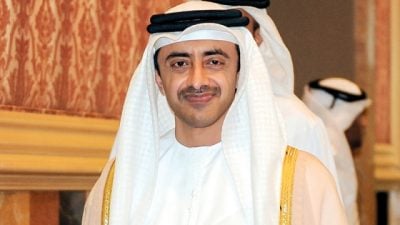UAE: “We Don’t Have Evidence” that Iran Carried Out Tanker Attacks

The United Arab Emirates appeared to part ways with the Trump administration Wednesday on the question of whether Iran is responsible for the recent attacks on merchant tankers in the Gulf of Oman.
The White House maintains that Iran or Iran-backed forces carried out the attacks, which damaged six vessels in two separate incidents in May and June. U.S. Central Command has released video and imagery showing what appear to be Iranian servicemembers removing a limpet mine from the hull of the tanker Kokuka Courageous after the second attack, and it has allowed media to view and photograph debris collected from the vessel.
However, the UAE said Wednesday that it would like more concrete proof before reaching a definitive conclusion that Iran was behind the attacks. Iran has so far denied involvement, though it claimed responsibility for shooting down an American surveillance drone on June 20.
“Honestly we can’t point the blame [for the tanker attacks] at any country because we don’t have evidence,” said UAE foreign minister Sheikh Abdullah Bin Zayed Al Nahyan, speaking alongside his Russian counterpart, Sergei Lavrov, at a joint press conference in Moscow. “If there is a country that has the evidence, then I’m convinced that the international community will listen to it. But we need to make sure the evidence is precise and convincing.”
In a joint investigation conducted with officials from Saudi Arabia and Norway, the UAE determined that the first attacks on tankers off Fujairah “were most probably carried out by actors with a considerable amount of intelligence and technical expertise,” but did not accuse any specific entity. Sheikh Bin Zayed said that that assessment has already been submitted to the UN Security Council and that “we will continue our commitment to professionalism on this issue.”
Lavrov’s presence provided subtext for the announcement: the Russian government has criticized U.S. policy towards Tehran, and a top official recently hinted that it might provide Iran with support if the U.S. should launch a retaliatory attack.
“Many other countries sympathize and empathize with Iran,” said Zamir Kabulov, a Russian special envoy, speaking to Kommersant Wednesday. “Tehran won’t be alone if the U.S., God forbid, takes insane and irresponsible actions against it.”
The UAE is an ally of the United States and of Saudi Arabia, which both accuse Iran of orchestrating the attacks. Sheikh Mohammad Bin Zayed Al Nahyan, crown prince of Abu Dhabi and the de facto ruler of the UAE, met Monday with U.S. Secretary of State Mike Pompeo; in a statement after the meeting, the sheikh’s office “reiterated that both countries are standing side by side toward the challenges besetting the region.”
*
Note to readers: please click the share buttons above or below. Forward this article to your email lists. Crosspost on your blog site, internet forums. etc.

